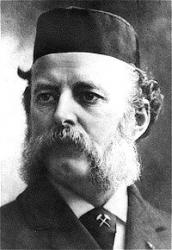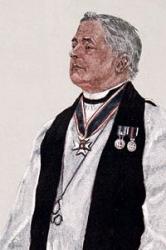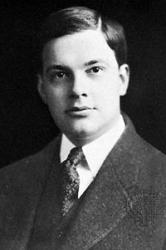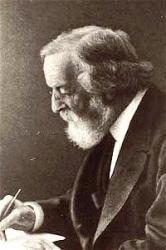Planning worship?
Check out our sister site, ZeteoSearch.org,
for 20+ additional resources related to your search.
- |
User Links
Person Results
‹ Return to hymnal




Export as CSV
Rossiter W. Raymond

1840 - 1918 Hymnal Number: 71 Author of "Star, star, beautiful star" in The School Hymnal Raymond, Rossiter Worthington, PH.D., was b. in Cincinnati, Ohio, April 27,1840. He graduated at Brooklyn Polytechnic, 1858, and also studied in Germany. He served in the Civil War of 1861-4 with the grade of Captain. Since then he has practised in New York as a consulting mining engineer. He was editor of the American Journal of Mining, and is a contributor to scientific literature. He has also written stories for children, a Paraphrase of Job, and some fugitive poetry. His hymns in common use include:—
1. Far out on the desolate billow. [God everywhere.] Written for the German tune, "Ich weiss nicht was soil es bedeuten," and published in The Plymouth Hymnal, 1894.
2. Morning red, Morning red. [Easter.] Written to the tune" Morgenroth," a German battle-song, and published in the American Book of Praise.
3. Now rest, ye pilgrim host. [Reviewing the Past.] This hymn is dated 1879, and was written for the 50th anniversary oi the Brooklyn Sunday School Union. It was included in The Plymouth Hymnal, 1891, No. 509, and, after revision by the author, in Sursum Corda, 1898, and other collections.
4. 0 Thou Who art inspiring. [Submission.] Appeared in The Plymouth Hymnal, 1894, No. 635, and later in other collections.
5. The God Who spann'd the heavens above. [Courage in Conflict.] "Written for my Sunday School, to be sung to the tune of the German patriotic song, ‘Der Gott, der Eisen wachsen liess' (by Arndt, p, 79, ii.), of which my first line is an evident and intentional imitation, though the remainder is not" (Author's MS.). It was published in The Book of Praise, the Sursum Corda, 1898, and others. It is sometimes attributed to "J. Clark,” but in error.
6. There dwelt in old Judaea. In Allon's Children's Worship, 1878.
Of the above Nos. 1, 2, 5 are in W. B. Bradbury's Clarion, 1867. Dr. Raymond is a Congregationalist, and is associated with the Plymouth Church, Brooklyn. [Rev. L. F. Benson, D.D.]
--John Julian, Dictionary of Hymnology, New Supplement (1907)
Rossiter W. Raymond
John E. Roe
1838 - 1871 Person Name: John Edward Roe Hymnal Number: 215 Composer of "WESTON" in The School Hymnal
John E. Roe
Alexander Gibson
Person Name: Alexander S. Gibson Hymnal Number: 216 Arranger of "SCHUBERT No. 2" in The School Hymnal
Alexander Gibson
George B. Nevin
1859 - 1933 Hymnal Number: 99b Composer of "CROWN HIM" in The School Hymnal Born: March 15, 1859, Shippensburg, Pennsylvania.
Died: April 17, 1933, Easton, Pennsylvania.
A member of the Nevin musical family, George’s cousins were composers Ethelbert and Arthur Nevin; his son, Gordon Balch Nevin, also became a composer. George spent most of his life in the town of Easton. His output consisted mainly of cantatas, and included such works as The Crown of Life and The Incarnation. He was also known for his setting of Sidney Lanier’s poem A Ballad of Trees and the Master, and wrote a number of hymns as well. For nearly 30 years, he ran a wholesale paper business in addition to composing.
Nevin was also a historian and lecturer, and sometimes gave lectures on subjects related to music history to local historical societies.
Sources:
New York Times, April 18, 1933, p. 16
http://www.hymntime.com/tch/bio/n/e/v/nevin_gb.htm
George B. Nevin
Thomas W. Freckelton
1827 - 1903 Person Name: Thomas W. Freckleton Hymnal Number: 173 Author of "O God, who workest hitherto" in The School Hymnal Freckelton, Thomas Wesley, b. 1827. Minister of Unity Church, Islington. His hymn, "The toil of brain, or heart, or hand" (Christian Service), is in J. P. Hopp’s Collection, 1877 and in Horder's Congregational Hymnal, 1884.
--John Julian, Dictionary of Hymnology (1907)
Thomas W. Freckelton
Robert H. McCartney
1844 - 1895 Person Name: R. H. McCartney Hymnal Number: 229 Composer of "WESTWOOD" in The School Hymnal
Robert H. McCartney
Eliza F. Morris
1821 - 1874 Hymnal Number: 21 Author of "God of pity, God of grace" in The School Hymnal Morris, Eliza Fanny, née Goffe, was born in London in 1821, and married in 1849 to Josiah Morris. She gained the prize for a poem on Kindness to Animals offered by the Band of Hope. Her published works are he Voice and the Reply, Worcester, 1858, and Life Lyrics. She also edited a Bible Class Hymn Book, and contributed the words to School Harmonies, published by her husband. Her hymns in common use include:—
1. Come unto Me and rest. Christ's Invitation. From The Voice and the Reply, 1858, into the 1874 Supplement to the New Congregational, in an altered form.
2. God of pity, God of grace. Lent. This hymn in Litany form appeared in Pt. ii. of The Voice and the Reply, 1858, entitled "The Prayer in the Temple." From Miller's Singers and Songs of the Church, 1869, we gather that this hymn was written on the 4th of Sept., 1857.
3. 0 Thou, blest Lamb of God. Love for and Trust in Jesus desired. From The Voice and the Reply, 1858, into the Anglican Hymn Book, 2nd ed., 1871. [Rev. W. Garrett Horder]
--John Julian, Dictionary of Hymnology (1907)
Eliza F. Morris
Frederick A. J. Hervey

1846 - 1910 Person Name: F. A. J. Hervey, (1846- ) Hymnal Number: 134 Composer of "HERVEY'S LITANY" in The School Hymnal Born: May 18, 1846, Westminster, Middlesex, England.
Died: August 8, 1910, Norwich, England.
Buried: St. Mary Magdalene’s Church, Sandringham, Norfolk, England.
Son of Alfred, Lord Hervey, Frederick was educated at Marlborough and Trinity College, Cambridge (BA 1868, MA 1872). He was ordained a deacon in 1869, and priest in 1870. He served as Rector of Upton-Pyne, Devon (1876); Sandringham (1878-1907); Canon of Norwich (1897); and Domestic Chaplain to King Edward VII (1901).
--www.hymntime.com/tch/
Frederick A. J. Hervey
Joyce Kilmer

1886 - 1918 Hymnal Number: 102 Author of "No longer of Him be it said" in The School Hymnal Joyce Kilmer (born as Alfred Joyce Kilmer; 6 December 1886 – 30 July 1918) was an American writer and poet mainly remembered for a short poem titled "Trees" (1913), which was published in the collection Trees and Other Poems in 1914. Though a prolific poet whose works celebrated the common beauty of the natural world as well as his Roman Catholic religious faith, Kilmer was also a journalist, literary critic, lecturer, and editor. While most of his works are largely unknown, a select few of his poems remain popular and are published frequently in anthologies. Several critics—including both Kilmer's contemporaries and modern scholars—have disparaged Kilmer's work as being too simple and overly sentimental, and suggested that his style was far too traditional, even archaic. Many writers, including notably Ogden Nash, have parodied Kilmer's work and style—as attested by the many parodies of "Trees".
At the time of his deployment to Europe during World War I, Kilmer was considered the leading American Roman Catholic poet and lecturer of his generation, whom critics often compared to British contemporaries G. K. Chesterton (1874–1936) and Hilaire Belloc (1870–1953). He enlisted in the New York National Guard and was deployed to France with the 69th Infantry Regiment (the famous "Fighting 69th") in 1917. He was killed by a sniper's bullet at the Second Battle of the Marne in 1918 at the age of 31. He was married to Aline Murray, also an accomplished poet and author, with whom he had five children.
Kilmer was born 6 December 1886 in New Brunswick, New Jersey, the fourth and youngest child of Annie Ellen Kilburn (1849–1932), a minor writer and composer, and Dr. Frederick Barnett Kilmer (1851–1934), a physician and analytical chemist employed by the Johnson and Johnson Company and inventor of the company's baby powder.] He was named Alfred Joyce Kilmer after two priests at Christ Church in New Brunswick: Alfred R. Taylor, the curate; and the Rev. Dr. Elisha Brooks Joyce (1857–1926), the rector. Christ Church is the oldest Episcopal parish in New Brunswick and the Kilmer family were parishioners. Rector Joyce, who served the parish from 1883 to 1916, baptised the young Kilmer. Kilmer's birthplace in New Brunswick, where the Kilmer family lived from 1886 to 1892, is still standing, and houses a small museum to Kilmer, as well as a few Middlesex County government offices.
Kilmer entered Rutgers College Grammar School (now Rutgers Preparatory School) in 1895 at the age of 8. During his years at the Grammar School, Kilmer was editor-in-chief of the school's paper, the Argo, and loved the classics but had difficulty with Greek. He won the first Lane Classical Prize, for oratory, and obtained a scholarship to Rutgers College which he would attend the following year. Despite his difficulties with Greek and mathematics, he stood at the head of his class in preparatory school.
After graduating from Rutgers College Grammar School in 1904, he continued his education at Rutgers College (now Rutgers University) from 1904 to 1906. At Rutgers, Kilmer was associate editor of the Targum, the campus newspaper, and a member of the Delta Upsilon fraternity. However, he was unable to complete the curriculum's rigorous mathematics requirement and was asked to repeat his sophomore year. Under pressure from his mother, Kilmer transferred to Columbia University in New York City.
At Columbia, Kilmer was vice-president of the Philolexian Society (a literary society), associate editor of Columbia Spectator (the campus newspaper), and member of the Debating Union. He completed his Bachelor of Arts (A.B.) degree and graduated from Columbia on 23 May 1908. Shortly after graduation, on 9 June 1908, he married Aline Murray (1888–1941), a fellow poet to whom he had been engaged since his sophomore year at Rutgers. The Kilmers had five children: Kenton Sinclair Kilmer (1909–1995); Michael Barry Kilmer (1916–1927); Deborah ("Sister Michael") Clanton Kilmer (1914–1999) who was a Catholic nun at the Saint Benedict’s Monastery; Rose Kilburn Kilmer (1912–1917); and Christopher Kilmer (1917–1984).
In the autumn of 1908, Kilmer was employed teaching Latin at Morristown High School in Morristown, New Jersey.[1] At this time, he began to submit essays to Red Cross Notes (including his first published piece—an essay on the "Psychology of Advertising") and his early poems to literary periodicals. Kilmer also wrote book reviews for The Literary Digest, Town & Country, The Nation, and The New York Times. By June 1909, Kilmer had abandoned any aspirations to continue teaching and relocated to New York City where he focused solely on developing a career as a writer.
From 1909–1912, Kilmer was employed by Funk and Wagnalls, which was preparing an edition of The Standard Dictionary that would be published in 1912.[1] According to Hillis, Kilmer's job "was to define ordinary words assigned to him at five cents for each word defined. This was a job at which one would ordinarily earn ten to twelve dollars a week, but Kilmer attacked the task with such vigor and speed that it was soon thought wisest to put him on a regular salary."
In 1911, Kilmer's first book of verse, entitled Summer of Love was published. Kilmer would later write that "...some of the poems in it, those inspired by genuine love, are not things of which to be ashamed, and you, understanding, would not be offended by the others."
In 1912, Kilmer became a special writer for the New York Times Review of Books and the New York Times Sunday Magazine and was often engaged in lecturing. He moved to Mahwah, New Jersey, where he resided until his service and death in World War I. By this time, he had become established as a published poet, and as a popular lecturer. According to Robert Holliday, Kilmer "frequently neglected to make any preparation for his speeches, not even choosing a subject until the beginning of the dinner which was to culminate in a specimen of his oratory. His constant research for the dictionary, and, later on, for his New York Times articles, must have given him a store of knowledge at his fingertips to be produced at a moment's notice for these emergencies."
When the Kilmers' daughter Rose (1912–1917) was stricken with poliomyelitis (also known as infantile paralysis) shortly after birth, they turned to their religious faith for comfort. A series of correspondence between Kilmer and Father James J. Daly led the Kilmers to convert to Roman Catholicism and they were received in the church in 1913. In one of these letters, Kilmer writes that he "believed in the Catholic position, the Catholic view of ethics and aesthetics, for a long time" and he "wanted something not intellectual, some conviction not mental – in fact I wanted Faith." Kilmer would stop "every morning for months" on his way "to the office and prayed for faith" claiming that when "faith did come, it came, I think, by way of my little paralyzed daughter. Her lifeless hands led me; I think her tiny feet know beautiful paths. You understand this and it gives me a selfish pleasure to write it down."
With the publication of "Trees" in the magazine Poetry in August 1913, Kilmer gained immense popularity as a poet across the United States. He had established himself as a successful lecturer—particularly one seeking to reach a Catholic audience. His close friend and editor, Robert Holliday, wrote that it "is not an unsupported assertion to say that he was in his time and place the laureate of the Catholic Church." Trees and Other Poems (1914) was published the following year. Over the next few years, Kilmer was prolific in his output—managing an intense schedule of lectures, publishing a large number of essays and literary criticism, and writing poetry. In 1915, he became poetry editor of Current Literature and contributing editor of Warner's Library of the World's Best Literature. In 1916 and 1917, before the American entry into World War I, Kilmer would publish four books: The Circus and Other Essays (1916), a series of interviews with literary personages entitled Literature in the Making (1917), Main Street and Other Poems (1917), and Dreams and Images: An Anthology of Catholic Poets (1917)
In April 1917, a few days after the United States entered World War I, Kilmer enlisted in the Seventh Regiment of the New York National Guard. In August, Kilmer was assigned as a statistician with the U.S. 69th Infantry Regiment (better known as the "Fighting 69th" and later re-designated the 165th Infantry Regiment), of the 42nd "Rainbow" Division, and quickly rose to the rank of sergeant. Though he was eligible for commission as an officer and often recommended for such posts during the course of the war, Kilmer refused, stating that he would rather be a sergeant in the Fighting 69th than an officer in any other regiment.
Shortly before his deployment to Europe, the Kilmers' daughter Rose had died, and twelve days later, their son Christopher was born. Before his departure, Kilmer had contracted with publishers to write a book about the war, deciding upon the title Here and There with the Fighting Sixty-Ninth. The regiment arrived in France in November 1917, and Kilmer wrote to his wife that he had not written "anything in prose or verse since I got here—except statistics—but I've stored up a lot of memories to turn into copy when I get a chance." Kilmer did not write such a book; however, toward the end of the year, he did find time to write prose sketches and poetry. The most notable of his poems during this period was "Rouge Bouquet " (1918) which commemorated the deaths of two dozen members of his regiment in an German artillery barrage on American trench positions in the Rouge Bouquet forest north-east of the French village of Baccarat. At the time, this was a relatively quiet sector of the front, but the first battalion was struck by a German heavy artillery bombardment on the afternoon of 7 March 1918 that buried 21 men of the unit, killing 19 (of which 14 remained entombed).
Kilmer led a scouting party to find the position of a German machine gun. When his comrades found him, some time later, they thought at first that he was peering over the edge of a little hill, where he had crawled for a better view. When he did not answer their call, they ran to him and found him dead. According to Father Francis P. Duffy: “A bullet had pierced his brain. His body was carried in and buried by the side of Ames. God rest his dear and gallant soul.” A sniper's bullet likely killed him immediately. According to military records, Kilmer died on the battlefield near Muercy Farm, beside the Ourcq River near the village of Seringes-et-Nesles, in France, on 30 July 1918 at the age of 31. For his valor, Kilmer was posthumously awarded the Croix de Guerre (War Cross) by the French Republic.
Kilmer was buried in the Oise-Aisne American Cemetery and Memorial, near Fere-en-Tardenois, Aisne, Picardy, France. A cenotaph erected to his memory is located on the Kilmer family plot in Elmwood Cemetery, in New Brunswick, New Jersey. A memorial mass was held at St. Patrick's Cathedral in Manhattan on 14 October 1918.
--en.wikipedia.org/wiki/
Joyce Kilmer
James Freeman Clarke

1810 - 1888 Hymnal Number: 115 Author of "Father, to us Thy children, humbly kneeling" in The School Hymnal Clarke, James Freeman, D.D., is a grandson of James Freeman (q. v.)> from whom he was named. He was born at Hanover, New Hampshire, April 4, 1810, and graduated at Harvard College, in Arts, in 1829, and in Divinity, 1833. Receiving ordination as a Unitarian Minister, he was Pastor at Louisville, Kentucky, from 1833 to 1840; of the Church of the Disciples, Boston, from 1811 to 1830; and also from 1853. Dr. Clarke for some time edited, whilst at Louisville, The Western Messenger, and is the author of Orthodoxy, its Truths and Errors, 1866; The Christian Doctrine of Forgiveness, 1852; The Christian Doctrine of Prayer, 1854, and other works. In 1844 he published the Hymn Book for the Church of the Disciples. This he enlarged in 1852. To each edition be contributed five hymns. Of these ten hymns five are found in the Lyra Sacra Americana The best known of Dr. Clarke's hymns are:—
1. Father, to us Thy children, humbly kneeling. [thoughts desired.] Dr. Clarke says this was manufactured from:—
2. Infinite Spirit, who art round us ever. [Holy thoughts desired], “which was written in Kentucky about 1833, and printed in the Dial soon after."
3. Brother, hast thou wandered far! [The Prodigal Son.] This appeared in his Disciples' Hymn Book, 1844, and is somewhat extensively used. It appeared in an Brother abbreviated form as, "Hast thou wasted all the powers?" beginning with stanza ii., in Hymns for the Church of Christ, Boston, 1853; Beecher's Plymouth Collection, 1855, and subsequently in others in Great Britain and America. The next three are also in one or two English collections.
4. To Thee, 0 God, in heaven. [Holy Baptism.] 1844.
5. To Him who children blessed. [Holy Baptism.] 1844.
6. Friend, whose presence in the house. [Christ's presence desired.] 1855. The beauty and value of this last hymn have been partly, and deserve to be more fully, recognized. It is found in Lyra Sac. Amer., which also has the following on "The Protestant Reformation":—
7. For all Thy gifts we praise Thee, Lord. This hymn was sung at the collation given by the Unitarians of New York and Brooklyn to the Members of the Convention assembled in the former city, Oct. 22, 1845. As originally written it contained 8 stanzas; the last two are omitted from both Lyra Sac. Americana and Putnam's Singers and Songs of the Liberal Faith. [Rev. F. M. Bird, M.A.]
--John Julian, Dictionary of Hymnology (1907)
James Freeman Clarke


 My Starred Hymns
My Starred Hymns


